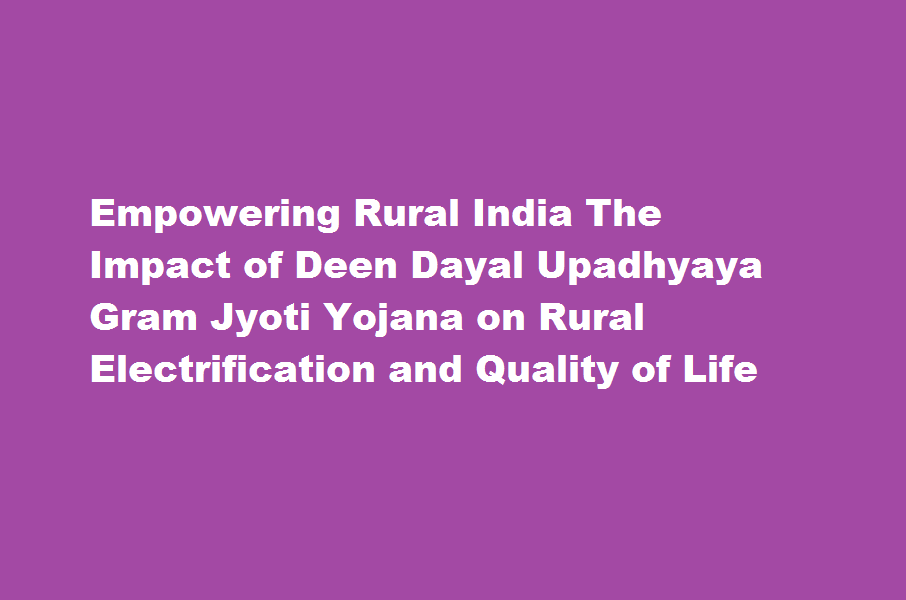Empowering Rural India The Impact of Deen Dayal Upadhyaya Gram Jyoti Yojana on Rural Electrification and Quality of Life
4 min read
Introduction
Access to electricity is crucial for the economic and social development of rural areas. To address the electrification gap and improve the quality of life in rural India, the government launched the Deen Dayal Upadhyaya Gram Jyoti Yojana (DDUGJY). This ambitious scheme aims to strengthen and extend the rural electricity infrastructure, ensuring reliable power supply and enhancing the overall well-being of rural communities. In this article, we will explore the impact of the Deen Dayal Upadhyaya Gram Jyoti Yojana on rural electrification and the enhancement of the quality of life in rural areas.
Accelerating Rural Electrification
The Deen Dayal Upadhyaya Gram Jyoti Yojana has played a pivotal role in accelerating rural electrification across the country. The scheme focuses on electrifying un-electrified villages, providing last-mile connectivity, and increasing the household electrification rate. Through the expansion and strengthening of the rural electricity infrastructure, the DDUGJY has significantly increased the accessibility of electricity to rural households, powering economic activities and improving the overall standard of living.
Reliable Power Supply
The DDUGJY aims to ensure a reliable power supply to rural areas, minimizing power outages and disruptions. The scheme emphasizes the strengthening of sub-transmission and distribution networks, installation of smart meters, and the adoption of technology-driven solutions. By improving the reliability of electricity supply, the DDUGJY supports the functioning of small businesses, agriculture, healthcare facilities, and educational institutions in rural areas, fostering economic growth and social progress.
Socio-economic Development
The availability of electricity through the DDUGJY has contributed significantly to socio-economic development in rural areas. Access to electricity has facilitated the establishment of small-scale industries, agro-processing units, and microenterprises, generating employment opportunities and income generation. It has also enhanced agricultural productivity through the use of electric pumps for irrigation, improving crop yield and farmers’ income. The scheme has empowered rural communities by enabling access to information and communication technology, promoting digital inclusion, and creating avenues for skill development and entrepreneurship.
Improved Access to Essential Services
The Deen Dayal Upadhyaya Gram Jyoti Yojana has facilitated improved access to essential services in rural areas. Availability of electricity has enhanced the functioning of healthcare centers, enabling reliable medical services, refrigeration for vaccines, and the operation of medical equipment. It has also facilitated the provision of quality education by powering schools, enabling digital learning, and extending study hours. Additionally, electricity has improved access to clean drinking water through electric pumps and water purification systems, ensuring better hygiene and sanitation practices.
Environmental Sustainability
The DDUGJY promotes environmental sustainability by encouraging the use of renewable energy sources and energy-efficient technologies. The scheme supports the installation of solar power plants, promoting clean and green energy generation in rural areas. By reducing reliance on fossil fuels, the scheme contributes to environmental conservation and mitigates the adverse effects of climate change, fostering a sustainable future for rural communities.
Conclusion
The Deen Dayal Upadhyaya Gram Jyoti Yojana has made remarkable strides in rural electrification and improving the quality of life in rural areas. By accelerating rural electrification, ensuring reliable power supply, driving socio-economic development, improving access to essential services, and promoting environmental sustainability, the DDUGJY has transformed the lives of millions of people in rural India. As the scheme continues to expand and evolve, it is essential to focus on its effective implementation, regular monitoring, and sustained investment to achieve comprehensive electrification and empower rural communities for a brighter future.
Frequently Asked Questions
What is the Deen Dayal Upadhyaya Gram Jyoti Yojana (DDUGJY)?
The Deen Dayal Upadhyaya Gram Jyoti Yojana is a government scheme aimed at strengthening and extending the rural electricity infrastructure, accelerating rural electrification, and improving the quality of life in rural areas.
How has the DDUGJY impacted rural electrification?
The DDUGJY has accelerated rural electrification by focusing on electrifying un-electrified villages and increasing the household electrification rate. The scheme has significantly increased the accessibility of electricity to rural households, powering economic activities and improving the standard of living.
What are the benefits of the Deen Dayal Upadhyaya Gram Jyoti Yojana for rural communities?
The DDUGJY brings numerous benefits to rural communities, including reliable power supply, socio-economic development, improved access to essential services such as healthcare and education, and environmental sustainability through the promotion of renewable energy sources.
How does the DDUGJY contribute to socio-economic development?
The DDUGJY contributes to socio-economic development by facilitating the establishment of small-scale industries, agro-processing units, and microenterprises in rural areas. It also enhances agricultural productivity, generates employment opportunities, promotes digital inclusion, and supports skill development and entrepreneurship.
How does the DDUGJY promote environmental sustainability?
The DDUGJY promotes environmental sustainability by encouraging the use of renewable energy sources and energy-efficient technologies. The scheme supports the installation of solar power plants, reducing reliance on fossil fuels and contributing to a cleaner and greener energy future.
Read Also : The Impact of The Mid-Day Meal Scheme on Education and Nutrition of Children in India






